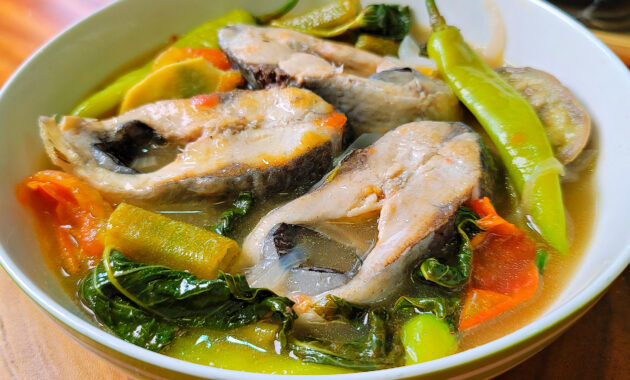Craving something warm, comforting, and bursting with flavor? Look no further than Sinigang, the iconic Filipino soup known for its delightful sourness! This recipe will guide you through creating a truly authentic and incredibly delicious Sinigang Soup right in your own kitchen. Whether you’re a seasoned chef or a beginner cook, our step-by-step instructions and helpful tips will ensure a perfect bowl of Sinigang every time. Get ready to experience a taste of the Philippines that will tantalize your taste buds and leave you wanting more. This vibrant and flavorful soup is a true celebration of Filipino cuisine, and we can’t wait to share our secrets to making it the best you’ve ever had.


Sinigang is more than just a soup; it’s a cultural icon. Each spoonful tells a story of Filipino ingenuity, resourcefulness, and the love for bold, contrasting flavors. The sourness, typically derived from tamarind, but sometimes guava, kamias, or even unripe mangoes, is the defining characteristic that sets it apart from other soups. The interplay of the sour broth with tender meat or seafood and a medley of fresh vegetables creates a harmonious balance that is both comforting and invigorating. This Sinigang Soup Recipe captures the essence of this beloved dish.

But what makes Sinigang so special? It’s the ability to adapt to regional tastes and available ingredients. From the classic Sinigang na Baboy (pork Sinigang) to Sinigang na Hipon (shrimp Sinigang) and even Sinigang na Isda (fish Sinigang), the possibilities are endless. You can customize the souring agent, the type of protein, and the selection of vegetables to create a Sinigang that perfectly suits your palate. Our recipe provides a solid foundation, but we encourage you to experiment and make it your own!

| Category | Value |
|---|---|
| Preparation Time | 25 minutes |
| Cooking Time | 50 minutes |
| Servings | 6-8 servings |
| Difficulty | Easy |
Before we dive into the ingredients, let’s talk about that signature sourness. Tamarind is the most common souring agent, and you can find it in various forms: fresh tamarind pods, tamarind paste, or tamarind powder. Tamarind paste is readily available in most Asian grocery stores and is a convenient option. However, if you can get your hands on fresh tamarind pods, the flavor is truly unmatched. Remember, the amount of tamarind you use will depend on your personal preference, so start with a smaller amount and adjust as needed. Taste is key to a perfect Sinigang!

Nutrition per serving (approximate)
Please note that these values are estimates and can vary based on specific ingredients and portion sizes.

| Nutrient | Amount |
|---|---|
| Calories | Approximately 350-450 kcal |
| Protein | 25-35g |
| Fat | 15-25g |
| Carbohydrates | 20-30g |
| Fiber | 5-8g |
Ingredients
Here’s what you’ll need to make our mouthwatering Sinigang Soup:

| Ingredient | Quantity |
|---|---|
| Pork Belly (or ribs), cut into 2-inch pieces | 1.5 lbs |
| Water | 8 cups |
| Onion, quartered | 1 large |
| Tomatoes, quartered | 2 medium |
| Tamarind Paste (or 1 packet of Sinigang mix) | 3 tablespoons |
| Fish Sauce (patis) | 2 tablespoons (or to taste) |
| Long Green Beans (sitaw), cut into 2-inch pieces | 1 cup |
| Eggplant, cut into 2-inch pieces | 1 medium |
| Water Spinach (kangkong) leaves | 2 cups |
| Radishes (labanos), sliced | 1 cup |
| Green Chili Peppers (siling haba) | 2-3 (optional, for extra spice) |
| Salt and Pepper | To taste |
Cooking Instructions
Now, let’s get cooking! Follow these simple steps to create a truly authentic Sinigang Soup:

- In a large pot or Dutch oven, combine the pork belly, water, onion, and tomatoes. Bring to a boil over high heat.
- Once boiling, reduce heat to low, cover, and simmer for about 40-45 minutes, or until the pork is tender. Skim off any scum that rises to the surface during cooking. This step is essential for a clear and flavorful broth for your Sinigang.
- If using fresh tamarind pods, soak them in a cup of hot water for about 15 minutes. Mash the tamarind with your fingers to release the pulp, then strain the mixture through a fine-mesh sieve, discarding the seeds and fibers. This tamarind water will be the base of your sour Sinigang broth.
- Add the tamarind paste (or Sinigang mix) to the pot. Stir well to dissolve. If using tamarind water from fresh pods, pour it into the pot now.
- Stir in the fish sauce. Season with salt and pepper to taste. Remember to start with a little salt and add more as needed, as the fish sauce is already salty. Taste the broth and adjust the sourness and saltiness to your liking. This is where you truly personalize your Sinigang Soup.
- Add the long green beans and eggplant to the pot. Cook for about 5-7 minutes, or until the vegetables are tender-crisp.
- Add the radishes and green chili peppers (if using). Cook for another 3 minutes.
- Finally, add the water spinach leaves. Cook for just 1-2 minutes, or until the leaves are wilted. Be careful not to overcook the spinach, as it will become mushy. The fresh green color of the spinach adds a beautiful visual element to the Sinigang.
- Remove from heat and serve hot. Ladle the Sinigang Soup into bowls, ensuring each serving has a good balance of meat, vegetables, and broth.
That’s it! You’ve just created a delicious and authentic Sinigang Soup that’s sure to impress your family and friends. Now, let’s explore some serving suggestions to elevate your Sinigang experience even further.

Serving Suggestions
- Serve Sinigang with a side of steamed white rice. The rice provides a neutral base that perfectly complements the sour and savory flavors of the soup.
- For an extra layer of flavor, serve with a small bowl of fish sauce and chili peppers on the side. This allows each person to customize the saltiness and spiciness of their Sinigang to their liking.
- Garnish with crispy fried garlic for added texture and aroma.
- Some people enjoy adding a dollop of bagoong (fermented shrimp paste) to their rice when eating Sinigang. The pungent flavor of bagoong adds a unique and complex element to the meal.
- Sinigang is often served as part of a larger Filipino meal, alongside dishes like adobo, lechon, and pancit.
Now that you know how to make the perfect Sinigang, here are some additional tips and tricks to ensure your success:

Tips and Notes:

- For a richer broth, you can use pork broth or chicken broth instead of water.
- If you don’t have tamarind paste, you can use other souring agents like guava, kamias, or unripe mangoes. Just adjust the amount to taste.
- You can add other vegetables to your Sinigang, such as okra, string beans, and mustard greens.
- For a spicier Sinigang, add more green chili peppers or a pinch of chili flakes.
- Leftover Sinigang can be stored in the refrigerator for up to 3 days. Reheat gently before serving.
- Don’t be afraid to experiment with different variations of Sinigang. Try using different types of meat or seafood, or adding different vegetables. The possibilities are endless! The key to great Sinigang Soup is adjusting the ingredients to your liking.
- The sourness of the soup is best enjoyed when it is freshly made. However, the flavors will continue to develop as it sits, so it can be even more delicious the next day.
- If you find that your Sinigang is too sour, you can add a little bit of sugar or honey to balance the flavors.
- Remember to adjust the cooking time based on the size of your pork pieces. Smaller pieces will cook faster than larger pieces.
With its distinctive sour flavor and comforting warmth, Sinigang Soup is a true culinary gem. We hope this recipe has inspired you to try making this beloved Filipino dish at home. Enjoy!








